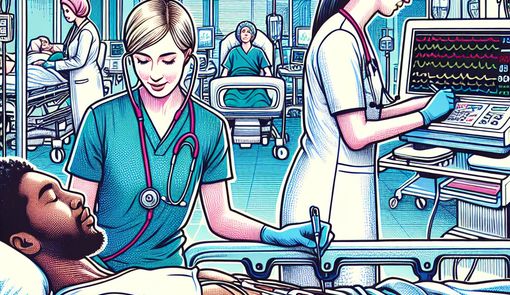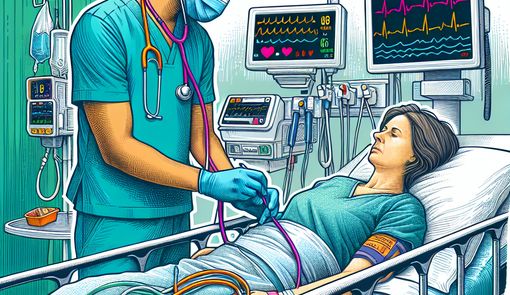Advancement Opportunities for Recovery Room Nurses

The role of Recovery Room Nurses, also known as Post-Anesthesia Care Unit (PACU) nurses, is a critical one in the healthcare setting. These specialized nurses provide care for patients as they recover from the effects of anesthesia following surgery. Their primary responsibilities include monitoring vital signs, managing pain, preventing complications, and ensuring that the patient safely regains consciousness. But what does the career ladder look like for those in this essential role, and how can they climb it to achieve professional growth? Let us explore the advancement opportunities available for Recovery Room Nurses and the pathways to navigate these opportunities successfully.
Understanding the Role and Responsibilities
Before diving into the career progression, it's essential to understand what Recovery Room Nurses do. They work in a fast-paced environment where quick thinking and adaptability are imperative. They must be able to interpret complex monitoring equipment, administer medications, and have excellent nursing skills to manage patients' needs immediately after surgery.
Starting Point: Entry-Level Recovery Room Nursing
The journey begins for many with an Associate's Degree in Nursing (ADN) or a Bachelor of Science in Nursing (BSN) and successful completion of the NCLEX-RN to become a Registered Nurse (RN). Following this, gaining experience in critical care or surgical nursing can be a valuable stepping stone before specializing as a Recovery Room Nurse.
Climbing the Ladder: Certification and Specialization
Advancement can come in the form of further education and certifications. Obtaining certification as a Certified Post Anesthesia Nurse (CPAN) or a Certified Ambulatory Peranesthesia Nurse (CAPA) signifies a higher level of knowledge in the field and can be beneficial in pursuing leadership roles. Continuing education credits are typically required to maintain these certifications, ensuring that nurses stay up-to-date with the latest practices.
Leadership Roles: Charge Nurse and Beyond
After proving their competency in the field, Recovery Room Nurses can aim for leadership positions such as Charge Nurse, PACU Manager, or Clinical Coordinator. These roles involve overseeing other nurses, managing schedules, and ensuring the delivery of quality care. They may also entail involvement in policy development and staff training.
Educational Advancement: From Clinician to Educator
Those who have a passion for teaching can pursue roles in education, such as a Clinical Nurse Educator or Nurse Educator, where they can impact future generations of nurses by sharing their expertise and guiding clinical practice.
Advanced Practice: Nurse Practitioner and Clinical Nurse Specialist
For Recovery Room Nurses looking to operate at an advanced practice level, becoming a Nurse Practitioner (NP) or Clinical Nurse Specialist (CNS) in anesthesia or a related field can provide the opportunity to diagnose and manage patient care autonomously. This often requires obtaining a Master's or Doctorate in Nursing Practice (DNP).
Interdisciplinary Roles: Collaboration with Other Healthcare Professionals
The interdisciplinary approach to healthcare is increasingly important, and Recovery Room Nurses can collaborate with pharmacists, therapists, and doctors to improve patient outcomes through integrated care models. They may also take on consulting roles or participate in committees that focus on improving patient safety and the quality of care.
Research and Doctoral Opportunities
Engagement in clinical research can be another avenue for advancement. Nurses with an interest in academia or evidence-based practice might consider pursuing a PhD in nursing or a DNP with a focus on research. Such roles contribute to the development of new nursing practices and policies that improve patient care.
Professional Organizations and Networking
Joining professional nursing organizations, such as the American Society of PeriAnesthesia Nurses, can provide networking opportunities, resources, and support for nurses at different stages of their career. It can also provide access to job openings at higher levels and professional development resources.
Personal Development: Soft Skills and Leadership Training
In addition to clinical skills, soft skills and leadership training are invaluable for career progression. Communication, team management, conflict resolution, and strategic thinking are crucial for higher-level roles. Many institutions offer leadership courses specifically designed for healthcare professionals.
Mentorship and Peer Support
Seeking mentors and supporting peers is beneficial in navigating the career ladder in nursing. Seasoned professionals can provide guidance and insights that could prove to be invaluable. Participating in peer review processes and support groups can foster a collaborative environment conducive to personal and professional growth.
The Path Forward
The pathway to advancement for Recovery Room Nurses is multifaceted and offers opportunities for vertical and horizontal career movement. By seeking advanced certifications, aiming for leadership positions, engaging in education, advancing into higher degrees, and taking an active role in research, nurses in the PACU can find a rewarding and dynamic career trajectory.
Secure, holistic patient care will always be at the core of Recovery Room Nursing, but the opportunity for personal and professional development is vast. Nurses can utilize their skills to impact patient care, shape practices and policies, and influence the next generation of healthcare professionals. With strategic planning, dedication, and a commitment to lifelong learning, Recovery Room Nurses can climb the career ladder and achieve professional fulfillment.
Frequently Asked Questions
1. What qualifications are needed to become a Recovery Room Nurse?
To become a Recovery Room Nurse, individuals typically need an Associate's Degree in Nursing (ADN) or a Bachelor of Science in Nursing (BSN) and must pass the NCLEX-RN exam to become a Registered Nurse (RN). Specializing in critical care or surgical nursing and obtaining certifications such as CPAN or CAPA can also enhance career prospects.
2. What are the primary responsibilities of a Recovery Room Nurse?
Recovery Room Nurses are responsible for monitoring patients as they recover from anesthesia, managing pain, preventing complications, and ensuring the safe recovery of patients post-surgery. They must have excellent nursing skills, be able to interpret monitoring equipment, and administer medications as needed.
3. How can Recovery Room Nurses advance in their careers?
Recovery Room Nurses can advance by obtaining certifications like CPAN or CAPA, pursuing leadership roles such as Charge Nurse or Clinical Coordinator, specializing as a Nurse Practitioner or Clinical Nurse Specialist, engaging in research, and participating in educational opportunities to transition into teaching roles.
4. What role do professional organizations play in the career development of Recovery Room Nurses?
Professional nursing organizations like the American Society of PeriAnesthesia Nurses offer networking opportunities, resources, and support for nurses at different career stages. They also provide access to job openings, professional development resources, and a platform for staying updated on industry trends.
5. How important are soft skills and leadership training for Recovery Room Nurses?
Soft skills and leadership training are essential for career progression in nursing. Skills like communication, team management, conflict resolution, and strategic thinking are crucial for higher-level roles such as Charge Nurse or PACU Manager. Institutions often offer leadership courses tailored for healthcare professionals to enhance these skills.
6. What is the significance of mentorship for Recovery Room Nurses?
Mentorship is vital for navigating the career ladder in nursing. Experienced professionals can provide valuable guidance and insights, while peer support through mentorship programs and support groups fosters a collaborative environment for personal and professional growth. Seeking mentorship can greatly benefit nurses in their career development.
7. How can Recovery Room Nurses contribute to interdisciplinary healthcare?
Recovery Room Nurses can collaborate with pharmacists, therapists, and doctors to improve patient outcomes through integrated care models. They may also engage in research, participate in committees focusing on patient safety, and take on consulting roles to enhance the quality of care provided.
8. What opportunities exist for educational advancement in the field of Recovery Room Nursing?
Educational advancement opportunities for Recovery Room Nurses include pursuing higher degrees like a Master's or Doctorate in Nursing Practice (DNP), specializing in anesthesia or related fields as Nurse Practitioners or Clinical Nurse Specialists, and exploring roles in academia as Clinical Nurse Educators or Nurse Educators.
Further Resources
For those interested in exploring advancement opportunities in the field of Recovery Room Nursing, the following resources can be valuable:
- American Society of PeriAnesthesia Nurses (ASPAN): This organization offers networking opportunities, educational resources, and support for nurses in the perianesthesia field.
- American Association of Critical-Care Nurses (AACN): AACN provides certification programs, continuing education, and leadership development resources for critical care nurses seeking career advancement.
- National Association of Clinical Nurse Specialists (NACNS): NACNS is a valuable resource for Clinical Nurse Specialists looking to enhance their practice through education, networking, and advocacy.
- American Nurses Association (ANA): ANA offers a wealth of resources for all nurses, including career development tools, educational opportunities, and advocacy support.
- Sigma Theta Tau International Honor Society of Nursing (Sigma): Sigma provides opportunities for networking, leadership development, and scholarly activities for nursing professionals aiming for excellence in their careers.
- Healthcare Information and Management Systems Society (HIMSS): HIMSS offers resources for nurses interested in the intersection of healthcare and technology, providing insights into innovative practices and career advancement in healthcare IT.
- National League for Nursing (NLN): NLN focuses on advancing excellence in nursing education, offering professional development resources for nurse educators and those pursuing teaching roles in the nursing field.
- Association of periOperative Registered Nurses (AORN): AORN provides resources and support for nurses in perioperative settings, offering educational opportunities and networking events for professional growth.
- PubMed: A valuable resource for nurses interested in research, PubMed offers access to a vast database of scientific literature and research articles in the healthcare field.
- Nurse.com: Nurse.com offers a platform for nurses to access continuing education courses, job opportunities, industry news, and career development resources.






